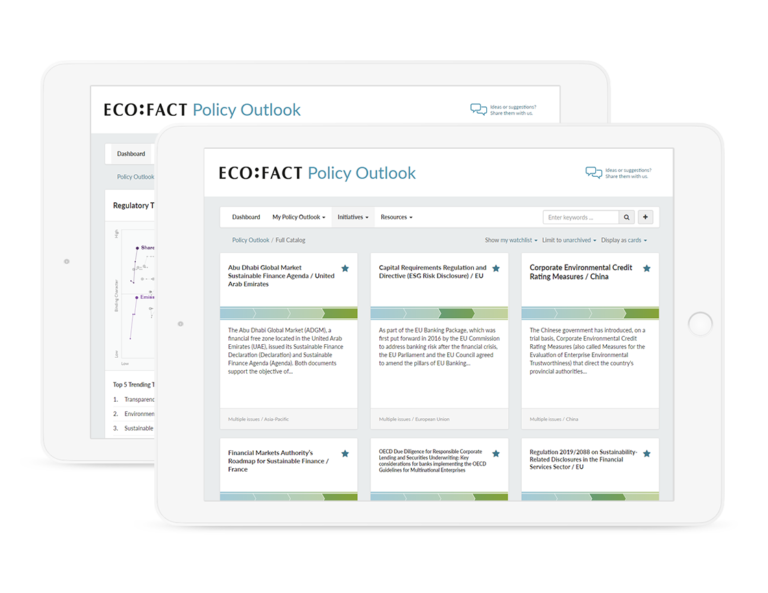Shareholder Requests to Address Climate Risk and Other ESG Issues
The 2019 proxy season was marked by an increased willingness among shareholders to hold boards accountable on director elections, executive remuneration, and environmental, social, and governance (ESG) shareholder proposals. When investors were asked what they expect from the 2020 proxy season it was evident that they are particularly interested in how companies are addressing ESG matters to build resiliency amid continued disruptive and accelerating climate risk. More than half of the responding investors cited effective management of environmental issues and climate change as critical to the strategic success of their portfolio companies over the next three to five years. In the same spirit, Larry Fink, Chairman and Chief Executive Officer of BlackRock, announced in his 2020 letter to clients a number of initiatives to place sustainability at the center of BlackRock’s investment approach. Similarly, in 2019, the Business Roundtable, a group of executives of major US corporations, released a new Statement on the Purpose of a Corporation that reflects a shift from shareholder primacy to a commitment to all stakeholders.
Shareholder proposals are a way for investors to push companies to address climate change risks and other ESG issues. They are a component of fundamental investor rights and understood as critical to the fulfillment of the active ownership principle. Generally, there is an upward trend in the number of shareholder proposals related to ESG issues that receive high levels of support from a wider shareholder base.
United States of America
Particularly in the USA, shareholder engagement has been the subject of extensive debate. In November 2019, the Securities and Exchange Commission (SEC) proposed changes to the shareholder proposal process which would increase resubmission thresholds for shareholders and lead to tighter regulations for proxy advisers. The proposal was fiercely criticized by the Principles for Responsible Investment, among others, for potentially introducing major barriers for shareholders wishing to stimulate ESG integration through this avenue.
Under the current US Exchange Act Rule 14a-8, eligible shareholders can submit proposals to be included in a public company’s proxy statement. If a company opposes a proposal, it must request an exclusion from the SEC by means of a ‘no-action letter’. For example, in January 2020, JP Morgan Chase requested permission from the SEC to omit a proposal that would require a report be included in the bank’s 2020 proxy materials on how its lending activities are aligned with the Paris Climate Agreement and how it intends to reduce the greenhouse gas emissions associated with its lending activities. The bank justified the proposal’s exclusion by suggesting that it related to the company’s ordinary business activities and sought to “micromanage” the company. The SEC’s response is outstanding. While the SEC has approved many of these no-action letters, its approach is disparate when it comes to financial institutions that use similar justification for omission, indicating that the regulator is evaluating each request on a case-by-case basis. For instance, four large US banks each sought to exclude a shareholder proposal asking them to demonstrate how they will fulfill the commitments their CEOs made in 2019 through the Business Roundtable (as described above). JP Morgan Chase was successful in blocking this proposal because it had already “substantially implemented” the request. Just days after, however, the SEC rejected Bank of America’s proposed exclusion of the discussion of Business Roundtable promises because it did not agree with the bank’s assertions that the proposal broke rules on micromanagement or vagueness.
European Union
In the EU, Directive 2017/828 of May 17, 2017 increased shareholders’ level of engagement in listed companies and aimed to enhance transparency in the investment chain and to hold investors accountable for the integration of ESG factors in investment decisions. In included new rules concerning: executive remuneration; related party transactions; better transparency of institutional investors, asset managers, and proxy advisors’ behavior; ESG integration; and improved shareholder identification and information. Member states were required to transpose the directive into national law by June 10, 2019 (see the resulting transposition in Austria, France, Germany, Luxembourg, Spain, and UK). In 2018, the EU Commission adopted Regulation 2018/1212 to specify minimum requirements in relation to shareholder identification, the transmission of information, and facilitation of shareholder rights. The regulation is binding and directly applicable in all member states from September 3, 2020. It is believed that this EU shareholder regime marks a profound shift for European asset managers and owners, and will have significant implications for asset managers’ investment and client reporting teams.
Besides this, related regulatory developments in EU countries can be found in the Policy Outlook, such as the revised 2020 UK Stewardship Code which includes an explicit expectation that signatories will take material ESG factors into account when fulfilling their stewardship responsibilities, and the 2020 revised Italian Corporate Governance Code which emphasizes the integration of sustainability into the strategies, risk management, and remuneration policies of listed companies.
Around the Globe
Beyond Europe and the USA, similar developments are being observed around the globe. For instance, India’s Stewardship Code for asset management companies and mutual funds investing in listed Indian companies enhances the responsibilities of institutional investors to protect the interests of their investors/beneficiaries and includes ESG integration. The code’s requirements will be mandatory once it comes into effect on April 1, 2020. In the same spirit, the revised draft of Japan’s Stewardship Code includes the addition of an expectation for the code’s signatories to consider sustainability issues in their investment strategies.
 All posts
All posts Contact
Contact



